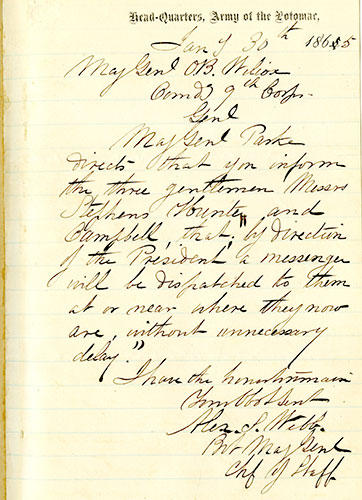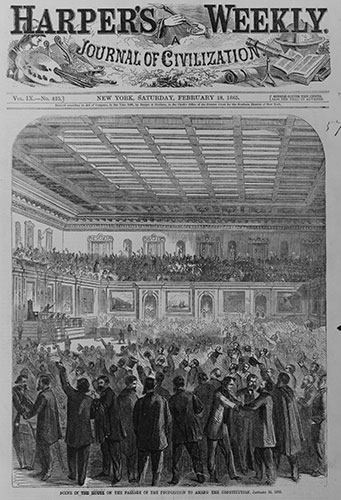
Major General Orlando B. Willcox, commanding the IX Corps, received this order from Major General John G. Parke, Acting Commander of the Army of the Potomac, directing him to inform the three Confederate peace commissioners to await a messenger from Washington.
Click Image to enlarge
President Abraham Lincoln faced a dilemma as January 1865 dawned. After an initial vote failed the previous June, the House of Representatives had renewed debate on a proposed 13th Amendment to the U.S. Constitution, which would abolish slavery. War-weary factions in the North and South were attempting to arrange a peace conference, but the news that peace commissioners might be en route to Washington alarmed many people in the capital. Radical Republicans demanded the Confederate armies surrender before discussing peace terms. Democrats, who had opposed Lincoln's antislavery policies, hesitated to support the 13th Amendment while a chance for a negotiated peace existed. Those Democratic votes would be necessary to achieve the necessary 2/3 vote on the amendment.
Lincoln had never recognized the Confederate states as a separate nation and refused to meet with Jefferson Davis, but allowed others to make inquiries about a possible conference. Lincoln insisted, however, the states in rebellion accept his condition that the Confederacy would return to "our one common country." Three Confederate peace commissioners, Alexander H. Stephens, John A. Campbell, and Robert M.T. Hunter, traveled from Richmond, Virginia to Union lines outside Petersburg in late January. Lincoln forbade the commissioners' passage into the capital, but allowed a conference at Fort Monroe.
Major General Orlando B. Willcox, temporarily commanding the IX Corps, received the first requests for the commissioners to pass through the lines on January 29, 1865. His request for instructions reached the War Department and the White House late that afternoon. The following morning, Lincoln dispatched an emissary to determine whether or not the Confederates intended to comply with his "one country" requirement before agreeing to peace talks, and sent word through the chain of command that a messenger was en route to meet with the commissioners.

Scene in the House on the passage of the proposition to amend the Constitution, January 31, 1865, from Harper's Weekly, February 18, 1865. [Source: Library of Congress]
Click Image to enlarge
The 13th Amendment passed by a narrow margin on January 31, removing all further barriers to the conference. Lincoln and Secretary of State William H. Seward met with the Confederate peace commissioners on February 3, on board the steamer River Queen, anchored in Hampton Roads, Virginia. The representatives discussed possible terms for ending the war, but the Hampton Roads Peace Conference failed to reach a peace agreement.

Text from the 13th Amendment. [Source: Library of Congress]

In association with the opening of the Smithsonian Institution's National Museum of African American History and Culture, this exhibit is currently on display at the U.S. Army Heritage and Education Center.